UUAC5300 Accounting & Finance: Interwood & Audit Analysis
VerifiedAdded on 2023/06/13
|18
|4424
|90
Homework Assignment
AI Summary
This accounting assignment consists of two questions. The first question discusses the differences between cash and accrual basis accounting, the responsibilities of an external auditor, the auditor's opinion on Air New Zealand's financial statements, an analysis of net profit and net cash inflow, the role of the audit committee, and contingent liabilities. The second question involves preparing a worksheet, balance sheet, and income statement for Interwood, along with a computation and analysis of net working capital. The assignment provides detailed workings and explanations for each calculation and analysis. Desklib offers a platform to explore similar solved assignments and past papers for students.
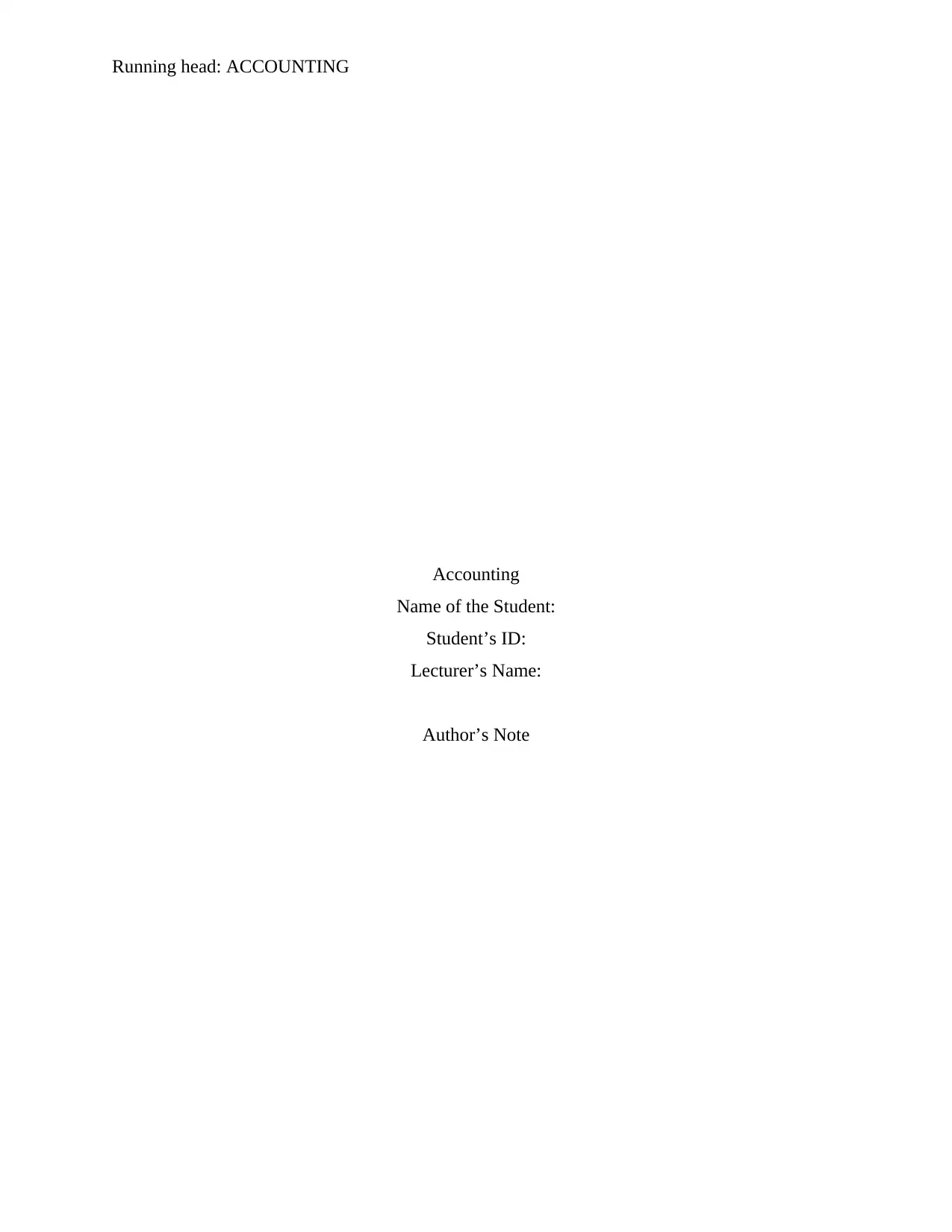
Running head: ACCOUNTING
Accounting
Name of the Student:
Student’s ID:
Lecturer’s Name:
Author’s Note
Accounting
Name of the Student:
Student’s ID:
Lecturer’s Name:
Author’s Note
Paraphrase This Document
Need a fresh take? Get an instant paraphrase of this document with our AI Paraphraser
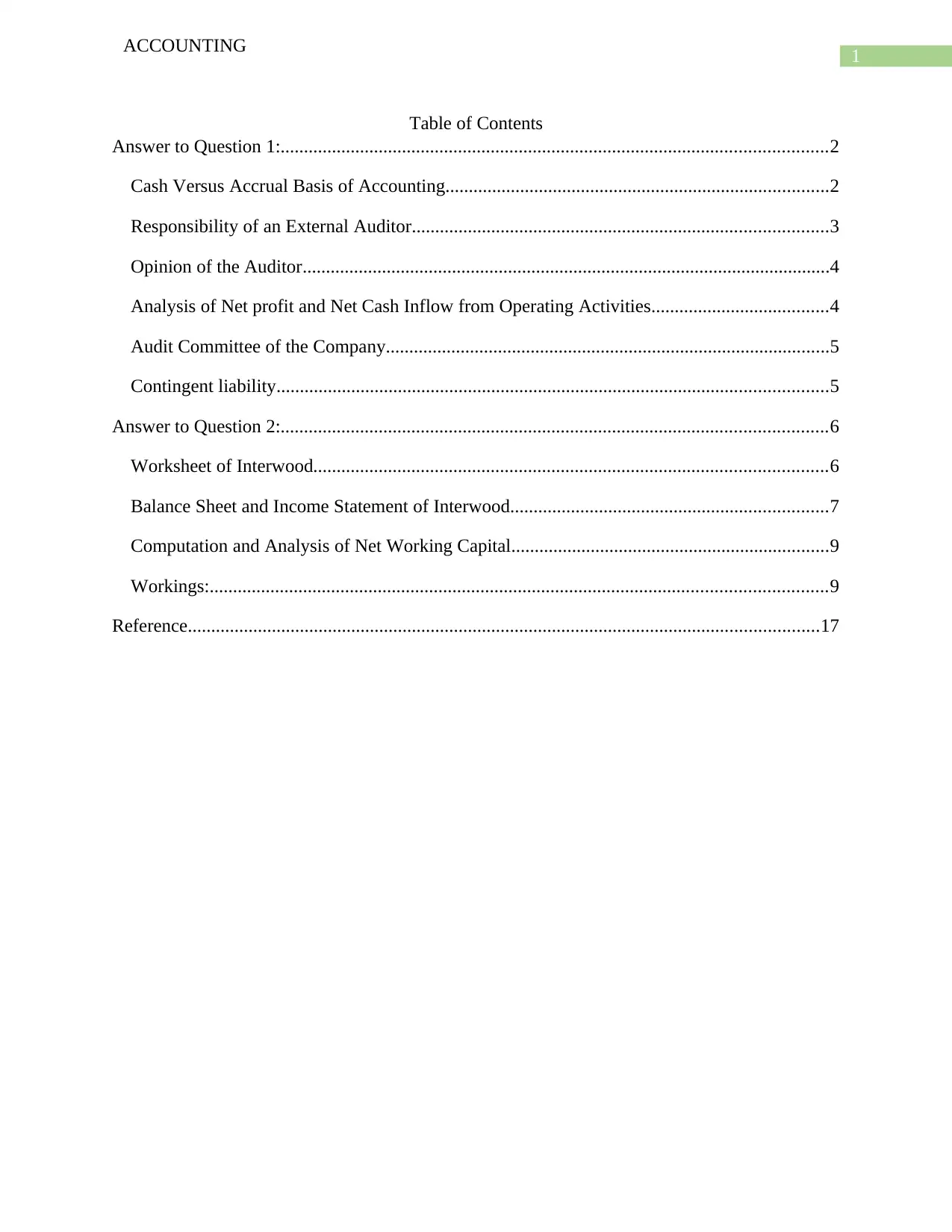
1
ACCOUNTING
Table of Contents
Answer to Question 1:.....................................................................................................................2
Cash Versus Accrual Basis of Accounting..................................................................................2
Responsibility of an External Auditor.........................................................................................3
Opinion of the Auditor.................................................................................................................4
Analysis of Net profit and Net Cash Inflow from Operating Activities......................................4
Audit Committee of the Company...............................................................................................5
Contingent liability......................................................................................................................5
Answer to Question 2:.....................................................................................................................6
Worksheet of Interwood..............................................................................................................6
Balance Sheet and Income Statement of Interwood....................................................................7
Computation and Analysis of Net Working Capital....................................................................9
Workings:....................................................................................................................................9
Reference.......................................................................................................................................17
ACCOUNTING
Table of Contents
Answer to Question 1:.....................................................................................................................2
Cash Versus Accrual Basis of Accounting..................................................................................2
Responsibility of an External Auditor.........................................................................................3
Opinion of the Auditor.................................................................................................................4
Analysis of Net profit and Net Cash Inflow from Operating Activities......................................4
Audit Committee of the Company...............................................................................................5
Contingent liability......................................................................................................................5
Answer to Question 2:.....................................................................................................................6
Worksheet of Interwood..............................................................................................................6
Balance Sheet and Income Statement of Interwood....................................................................7
Computation and Analysis of Net Working Capital....................................................................9
Workings:....................................................................................................................................9
Reference.......................................................................................................................................17
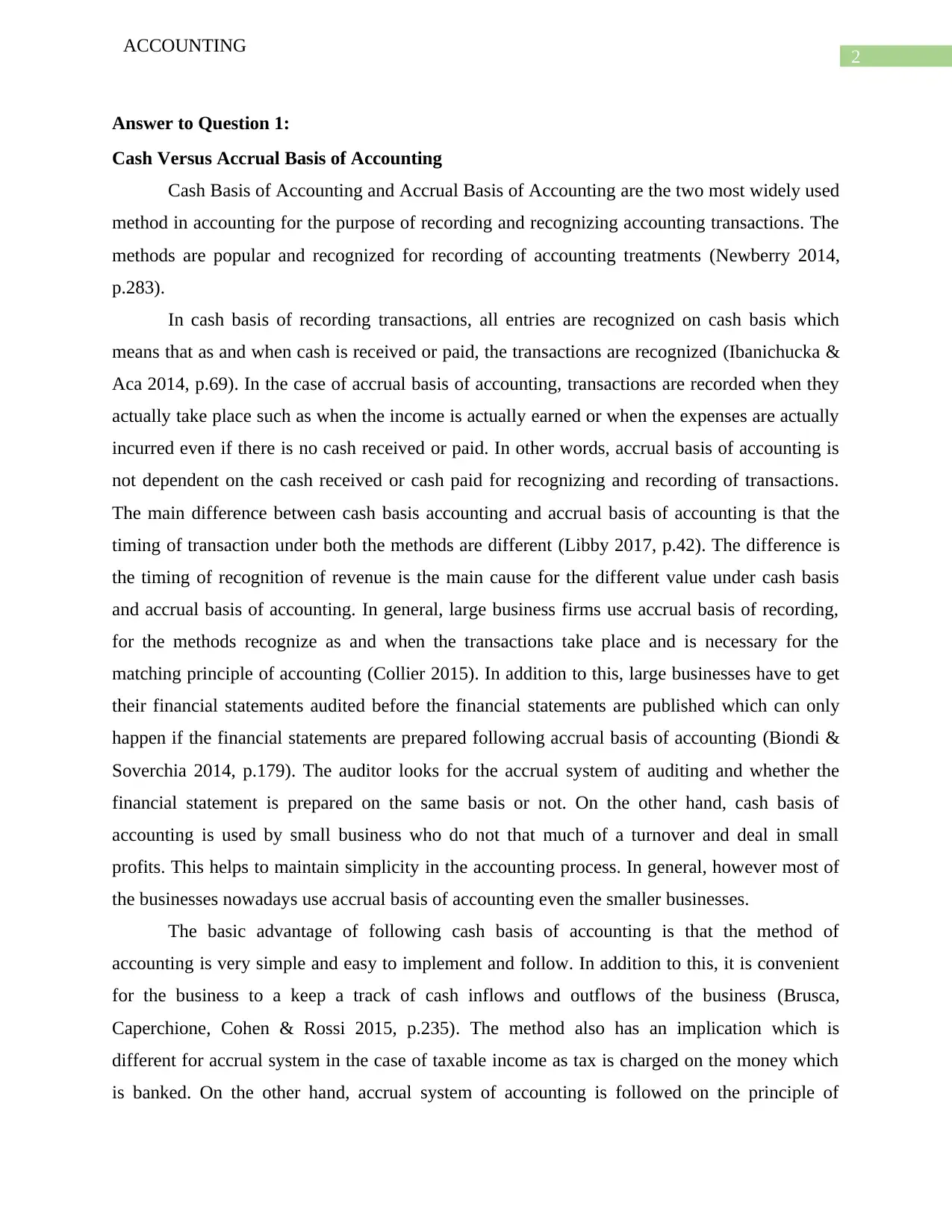
2
ACCOUNTING
Answer to Question 1:
Cash Versus Accrual Basis of Accounting
Cash Basis of Accounting and Accrual Basis of Accounting are the two most widely used
method in accounting for the purpose of recording and recognizing accounting transactions. The
methods are popular and recognized for recording of accounting treatments (Newberry 2014,
p.283).
In cash basis of recording transactions, all entries are recognized on cash basis which
means that as and when cash is received or paid, the transactions are recognized (Ibanichucka &
Aca 2014, p.69). In the case of accrual basis of accounting, transactions are recorded when they
actually take place such as when the income is actually earned or when the expenses are actually
incurred even if there is no cash received or paid. In other words, accrual basis of accounting is
not dependent on the cash received or cash paid for recognizing and recording of transactions.
The main difference between cash basis accounting and accrual basis of accounting is that the
timing of transaction under both the methods are different (Libby 2017, p.42). The difference is
the timing of recognition of revenue is the main cause for the different value under cash basis
and accrual basis of accounting. In general, large business firms use accrual basis of recording,
for the methods recognize as and when the transactions take place and is necessary for the
matching principle of accounting (Collier 2015). In addition to this, large businesses have to get
their financial statements audited before the financial statements are published which can only
happen if the financial statements are prepared following accrual basis of accounting (Biondi &
Soverchia 2014, p.179). The auditor looks for the accrual system of auditing and whether the
financial statement is prepared on the same basis or not. On the other hand, cash basis of
accounting is used by small business who do not that much of a turnover and deal in small
profits. This helps to maintain simplicity in the accounting process. In general, however most of
the businesses nowadays use accrual basis of accounting even the smaller businesses.
The basic advantage of following cash basis of accounting is that the method of
accounting is very simple and easy to implement and follow. In addition to this, it is convenient
for the business to a keep a track of cash inflows and outflows of the business (Brusca,
Caperchione, Cohen & Rossi 2015, p.235). The method also has an implication which is
different for accrual system in the case of taxable income as tax is charged on the money which
is banked. On the other hand, accrual system of accounting is followed on the principle of
ACCOUNTING
Answer to Question 1:
Cash Versus Accrual Basis of Accounting
Cash Basis of Accounting and Accrual Basis of Accounting are the two most widely used
method in accounting for the purpose of recording and recognizing accounting transactions. The
methods are popular and recognized for recording of accounting treatments (Newberry 2014,
p.283).
In cash basis of recording transactions, all entries are recognized on cash basis which
means that as and when cash is received or paid, the transactions are recognized (Ibanichucka &
Aca 2014, p.69). In the case of accrual basis of accounting, transactions are recorded when they
actually take place such as when the income is actually earned or when the expenses are actually
incurred even if there is no cash received or paid. In other words, accrual basis of accounting is
not dependent on the cash received or cash paid for recognizing and recording of transactions.
The main difference between cash basis accounting and accrual basis of accounting is that the
timing of transaction under both the methods are different (Libby 2017, p.42). The difference is
the timing of recognition of revenue is the main cause for the different value under cash basis
and accrual basis of accounting. In general, large business firms use accrual basis of recording,
for the methods recognize as and when the transactions take place and is necessary for the
matching principle of accounting (Collier 2015). In addition to this, large businesses have to get
their financial statements audited before the financial statements are published which can only
happen if the financial statements are prepared following accrual basis of accounting (Biondi &
Soverchia 2014, p.179). The auditor looks for the accrual system of auditing and whether the
financial statement is prepared on the same basis or not. On the other hand, cash basis of
accounting is used by small business who do not that much of a turnover and deal in small
profits. This helps to maintain simplicity in the accounting process. In general, however most of
the businesses nowadays use accrual basis of accounting even the smaller businesses.
The basic advantage of following cash basis of accounting is that the method of
accounting is very simple and easy to implement and follow. In addition to this, it is convenient
for the business to a keep a track of cash inflows and outflows of the business (Brusca,
Caperchione, Cohen & Rossi 2015, p.235). The method also has an implication which is
different for accrual system in the case of taxable income as tax is charged on the money which
is banked. On the other hand, accrual system of accounting is followed on the principle of
⊘ This is a preview!⊘
Do you want full access?
Subscribe today to unlock all pages.

Trusted by 1+ million students worldwide
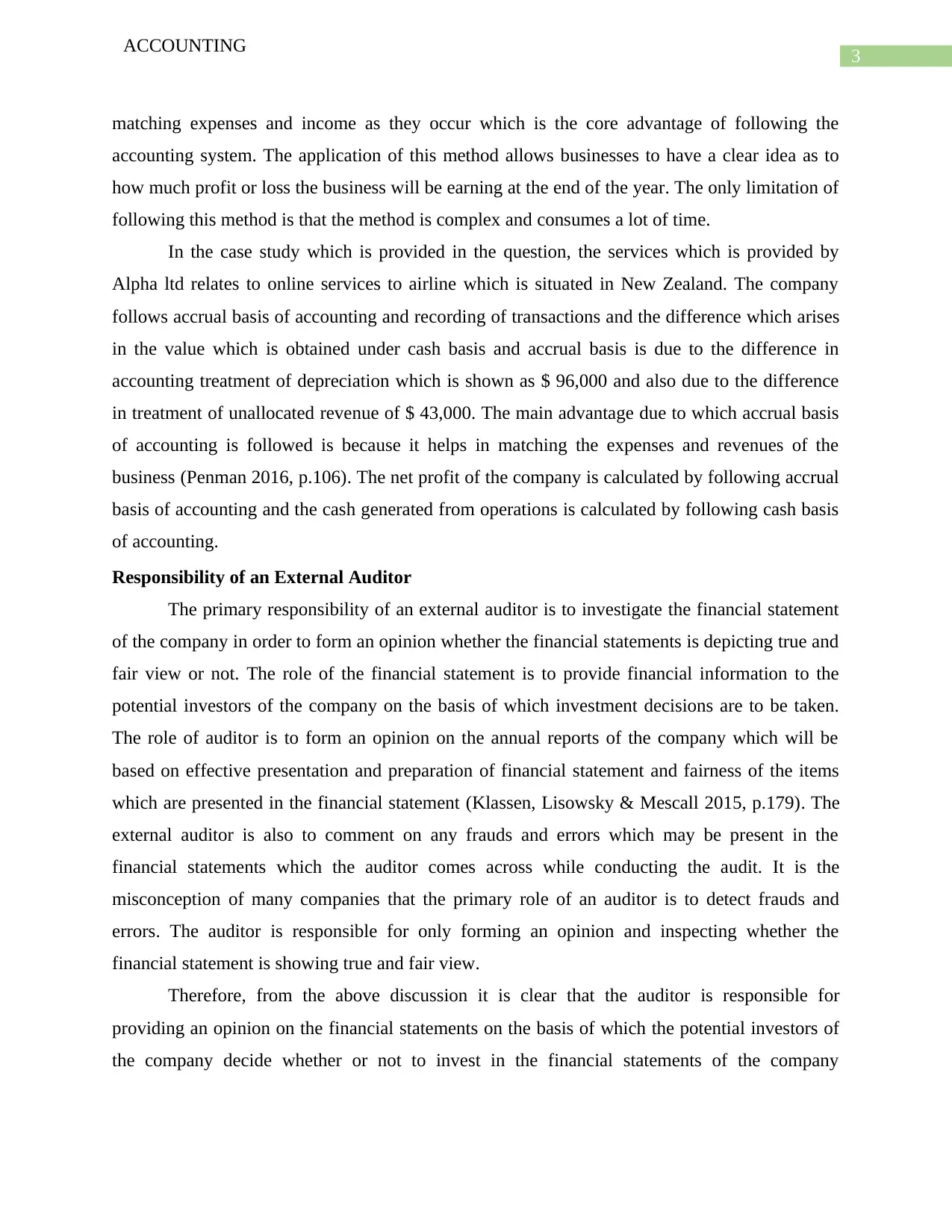
3
ACCOUNTING
matching expenses and income as they occur which is the core advantage of following the
accounting system. The application of this method allows businesses to have a clear idea as to
how much profit or loss the business will be earning at the end of the year. The only limitation of
following this method is that the method is complex and consumes a lot of time.
In the case study which is provided in the question, the services which is provided by
Alpha ltd relates to online services to airline which is situated in New Zealand. The company
follows accrual basis of accounting and recording of transactions and the difference which arises
in the value which is obtained under cash basis and accrual basis is due to the difference in
accounting treatment of depreciation which is shown as $ 96,000 and also due to the difference
in treatment of unallocated revenue of $ 43,000. The main advantage due to which accrual basis
of accounting is followed is because it helps in matching the expenses and revenues of the
business (Penman 2016, p.106). The net profit of the company is calculated by following accrual
basis of accounting and the cash generated from operations is calculated by following cash basis
of accounting.
Responsibility of an External Auditor
The primary responsibility of an external auditor is to investigate the financial statement
of the company in order to form an opinion whether the financial statements is depicting true and
fair view or not. The role of the financial statement is to provide financial information to the
potential investors of the company on the basis of which investment decisions are to be taken.
The role of auditor is to form an opinion on the annual reports of the company which will be
based on effective presentation and preparation of financial statement and fairness of the items
which are presented in the financial statement (Klassen, Lisowsky & Mescall 2015, p.179). The
external auditor is also to comment on any frauds and errors which may be present in the
financial statements which the auditor comes across while conducting the audit. It is the
misconception of many companies that the primary role of an auditor is to detect frauds and
errors. The auditor is responsible for only forming an opinion and inspecting whether the
financial statement is showing true and fair view.
Therefore, from the above discussion it is clear that the auditor is responsible for
providing an opinion on the financial statements on the basis of which the potential investors of
the company decide whether or not to invest in the financial statements of the company
ACCOUNTING
matching expenses and income as they occur which is the core advantage of following the
accounting system. The application of this method allows businesses to have a clear idea as to
how much profit or loss the business will be earning at the end of the year. The only limitation of
following this method is that the method is complex and consumes a lot of time.
In the case study which is provided in the question, the services which is provided by
Alpha ltd relates to online services to airline which is situated in New Zealand. The company
follows accrual basis of accounting and recording of transactions and the difference which arises
in the value which is obtained under cash basis and accrual basis is due to the difference in
accounting treatment of depreciation which is shown as $ 96,000 and also due to the difference
in treatment of unallocated revenue of $ 43,000. The main advantage due to which accrual basis
of accounting is followed is because it helps in matching the expenses and revenues of the
business (Penman 2016, p.106). The net profit of the company is calculated by following accrual
basis of accounting and the cash generated from operations is calculated by following cash basis
of accounting.
Responsibility of an External Auditor
The primary responsibility of an external auditor is to investigate the financial statement
of the company in order to form an opinion whether the financial statements is depicting true and
fair view or not. The role of the financial statement is to provide financial information to the
potential investors of the company on the basis of which investment decisions are to be taken.
The role of auditor is to form an opinion on the annual reports of the company which will be
based on effective presentation and preparation of financial statement and fairness of the items
which are presented in the financial statement (Klassen, Lisowsky & Mescall 2015, p.179). The
external auditor is also to comment on any frauds and errors which may be present in the
financial statements which the auditor comes across while conducting the audit. It is the
misconception of many companies that the primary role of an auditor is to detect frauds and
errors. The auditor is responsible for only forming an opinion and inspecting whether the
financial statement is showing true and fair view.
Therefore, from the above discussion it is clear that the auditor is responsible for
providing an opinion on the financial statements on the basis of which the potential investors of
the company decide whether or not to invest in the financial statements of the company
Paraphrase This Document
Need a fresh take? Get an instant paraphrase of this document with our AI Paraphraser
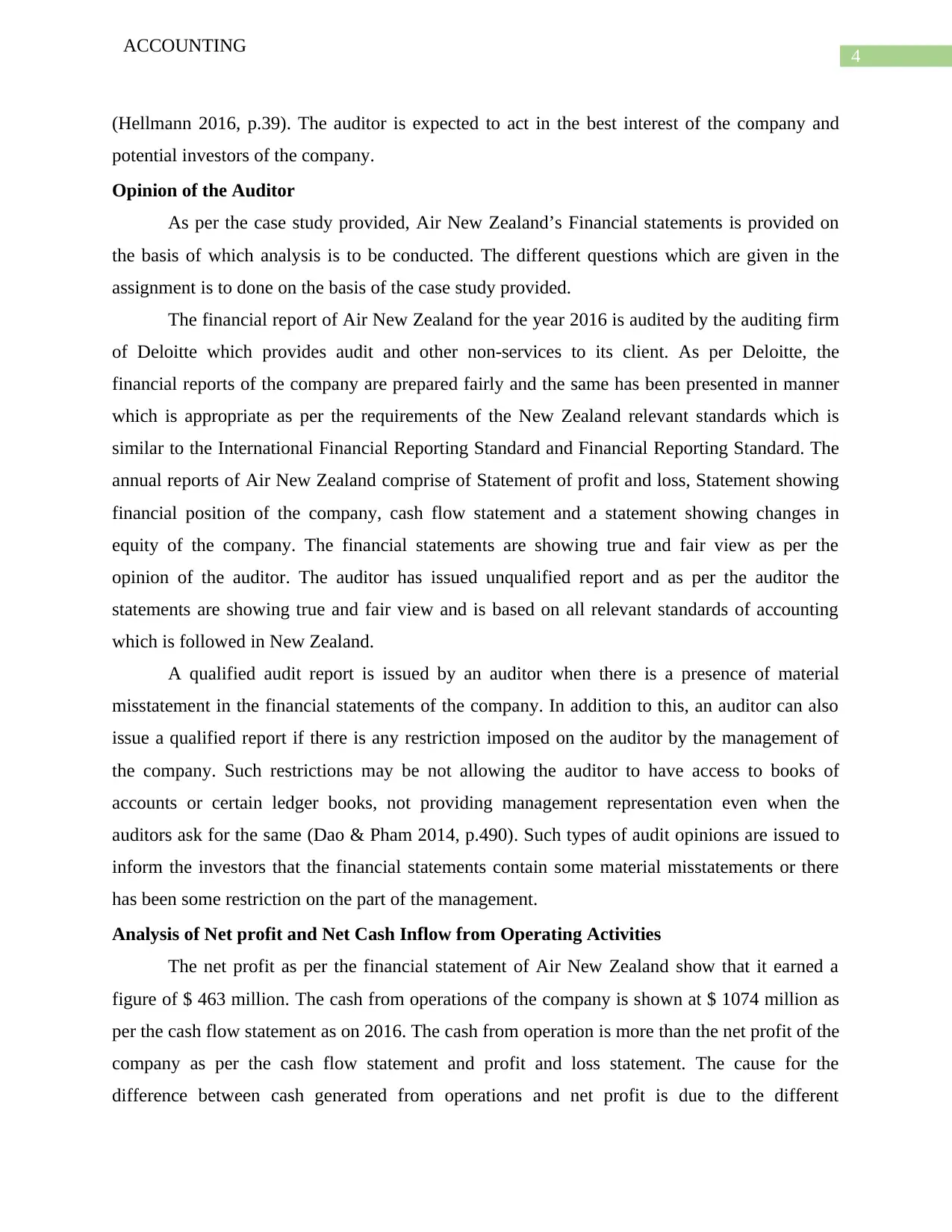
4
ACCOUNTING
(Hellmann 2016, p.39). The auditor is expected to act in the best interest of the company and
potential investors of the company.
Opinion of the Auditor
As per the case study provided, Air New Zealand’s Financial statements is provided on
the basis of which analysis is to be conducted. The different questions which are given in the
assignment is to done on the basis of the case study provided.
The financial report of Air New Zealand for the year 2016 is audited by the auditing firm
of Deloitte which provides audit and other non-services to its client. As per Deloitte, the
financial reports of the company are prepared fairly and the same has been presented in manner
which is appropriate as per the requirements of the New Zealand relevant standards which is
similar to the International Financial Reporting Standard and Financial Reporting Standard. The
annual reports of Air New Zealand comprise of Statement of profit and loss, Statement showing
financial position of the company, cash flow statement and a statement showing changes in
equity of the company. The financial statements are showing true and fair view as per the
opinion of the auditor. The auditor has issued unqualified report and as per the auditor the
statements are showing true and fair view and is based on all relevant standards of accounting
which is followed in New Zealand.
A qualified audit report is issued by an auditor when there is a presence of material
misstatement in the financial statements of the company. In addition to this, an auditor can also
issue a qualified report if there is any restriction imposed on the auditor by the management of
the company. Such restrictions may be not allowing the auditor to have access to books of
accounts or certain ledger books, not providing management representation even when the
auditors ask for the same (Dao & Pham 2014, p.490). Such types of audit opinions are issued to
inform the investors that the financial statements contain some material misstatements or there
has been some restriction on the part of the management.
Analysis of Net profit and Net Cash Inflow from Operating Activities
The net profit as per the financial statement of Air New Zealand show that it earned a
figure of $ 463 million. The cash from operations of the company is shown at $ 1074 million as
per the cash flow statement as on 2016. The cash from operation is more than the net profit of the
company as per the cash flow statement and profit and loss statement. The cause for the
difference between cash generated from operations and net profit is due to the different
ACCOUNTING
(Hellmann 2016, p.39). The auditor is expected to act in the best interest of the company and
potential investors of the company.
Opinion of the Auditor
As per the case study provided, Air New Zealand’s Financial statements is provided on
the basis of which analysis is to be conducted. The different questions which are given in the
assignment is to done on the basis of the case study provided.
The financial report of Air New Zealand for the year 2016 is audited by the auditing firm
of Deloitte which provides audit and other non-services to its client. As per Deloitte, the
financial reports of the company are prepared fairly and the same has been presented in manner
which is appropriate as per the requirements of the New Zealand relevant standards which is
similar to the International Financial Reporting Standard and Financial Reporting Standard. The
annual reports of Air New Zealand comprise of Statement of profit and loss, Statement showing
financial position of the company, cash flow statement and a statement showing changes in
equity of the company. The financial statements are showing true and fair view as per the
opinion of the auditor. The auditor has issued unqualified report and as per the auditor the
statements are showing true and fair view and is based on all relevant standards of accounting
which is followed in New Zealand.
A qualified audit report is issued by an auditor when there is a presence of material
misstatement in the financial statements of the company. In addition to this, an auditor can also
issue a qualified report if there is any restriction imposed on the auditor by the management of
the company. Such restrictions may be not allowing the auditor to have access to books of
accounts or certain ledger books, not providing management representation even when the
auditors ask for the same (Dao & Pham 2014, p.490). Such types of audit opinions are issued to
inform the investors that the financial statements contain some material misstatements or there
has been some restriction on the part of the management.
Analysis of Net profit and Net Cash Inflow from Operating Activities
The net profit as per the financial statement of Air New Zealand show that it earned a
figure of $ 463 million. The cash from operations of the company is shown at $ 1074 million as
per the cash flow statement as on 2016. The cash from operation is more than the net profit of the
company as per the cash flow statement and profit and loss statement. The cause for the
difference between cash generated from operations and net profit is due to the different
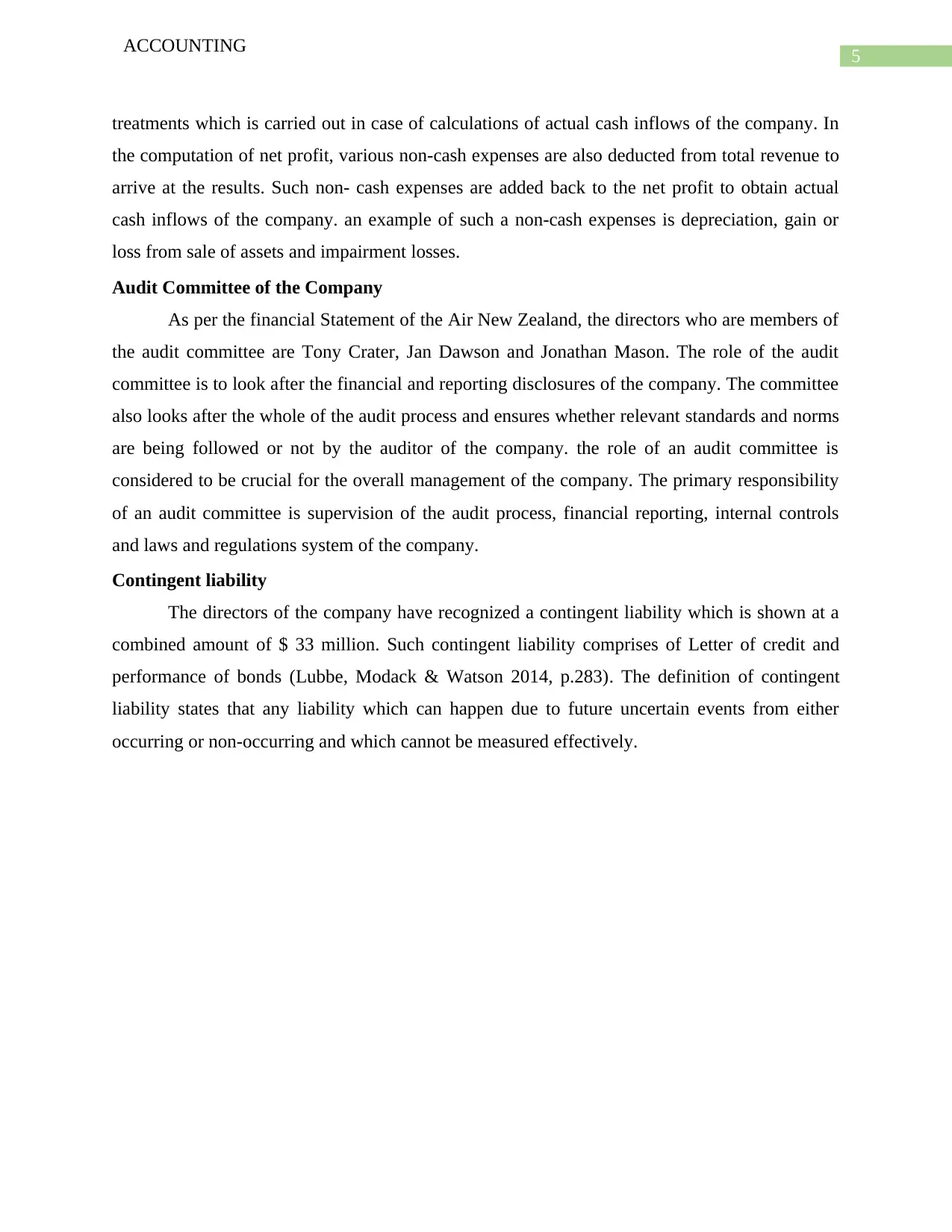
5
ACCOUNTING
treatments which is carried out in case of calculations of actual cash inflows of the company. In
the computation of net profit, various non-cash expenses are also deducted from total revenue to
arrive at the results. Such non- cash expenses are added back to the net profit to obtain actual
cash inflows of the company. an example of such a non-cash expenses is depreciation, gain or
loss from sale of assets and impairment losses.
Audit Committee of the Company
As per the financial Statement of the Air New Zealand, the directors who are members of
the audit committee are Tony Crater, Jan Dawson and Jonathan Mason. The role of the audit
committee is to look after the financial and reporting disclosures of the company. The committee
also looks after the whole of the audit process and ensures whether relevant standards and norms
are being followed or not by the auditor of the company. the role of an audit committee is
considered to be crucial for the overall management of the company. The primary responsibility
of an audit committee is supervision of the audit process, financial reporting, internal controls
and laws and regulations system of the company.
Contingent liability
The directors of the company have recognized a contingent liability which is shown at a
combined amount of $ 33 million. Such contingent liability comprises of Letter of credit and
performance of bonds (Lubbe, Modack & Watson 2014, p.283). The definition of contingent
liability states that any liability which can happen due to future uncertain events from either
occurring or non-occurring and which cannot be measured effectively.
ACCOUNTING
treatments which is carried out in case of calculations of actual cash inflows of the company. In
the computation of net profit, various non-cash expenses are also deducted from total revenue to
arrive at the results. Such non- cash expenses are added back to the net profit to obtain actual
cash inflows of the company. an example of such a non-cash expenses is depreciation, gain or
loss from sale of assets and impairment losses.
Audit Committee of the Company
As per the financial Statement of the Air New Zealand, the directors who are members of
the audit committee are Tony Crater, Jan Dawson and Jonathan Mason. The role of the audit
committee is to look after the financial and reporting disclosures of the company. The committee
also looks after the whole of the audit process and ensures whether relevant standards and norms
are being followed or not by the auditor of the company. the role of an audit committee is
considered to be crucial for the overall management of the company. The primary responsibility
of an audit committee is supervision of the audit process, financial reporting, internal controls
and laws and regulations system of the company.
Contingent liability
The directors of the company have recognized a contingent liability which is shown at a
combined amount of $ 33 million. Such contingent liability comprises of Letter of credit and
performance of bonds (Lubbe, Modack & Watson 2014, p.283). The definition of contingent
liability states that any liability which can happen due to future uncertain events from either
occurring or non-occurring and which cannot be measured effectively.
⊘ This is a preview!⊘
Do you want full access?
Subscribe today to unlock all pages.

Trusted by 1+ million students worldwide
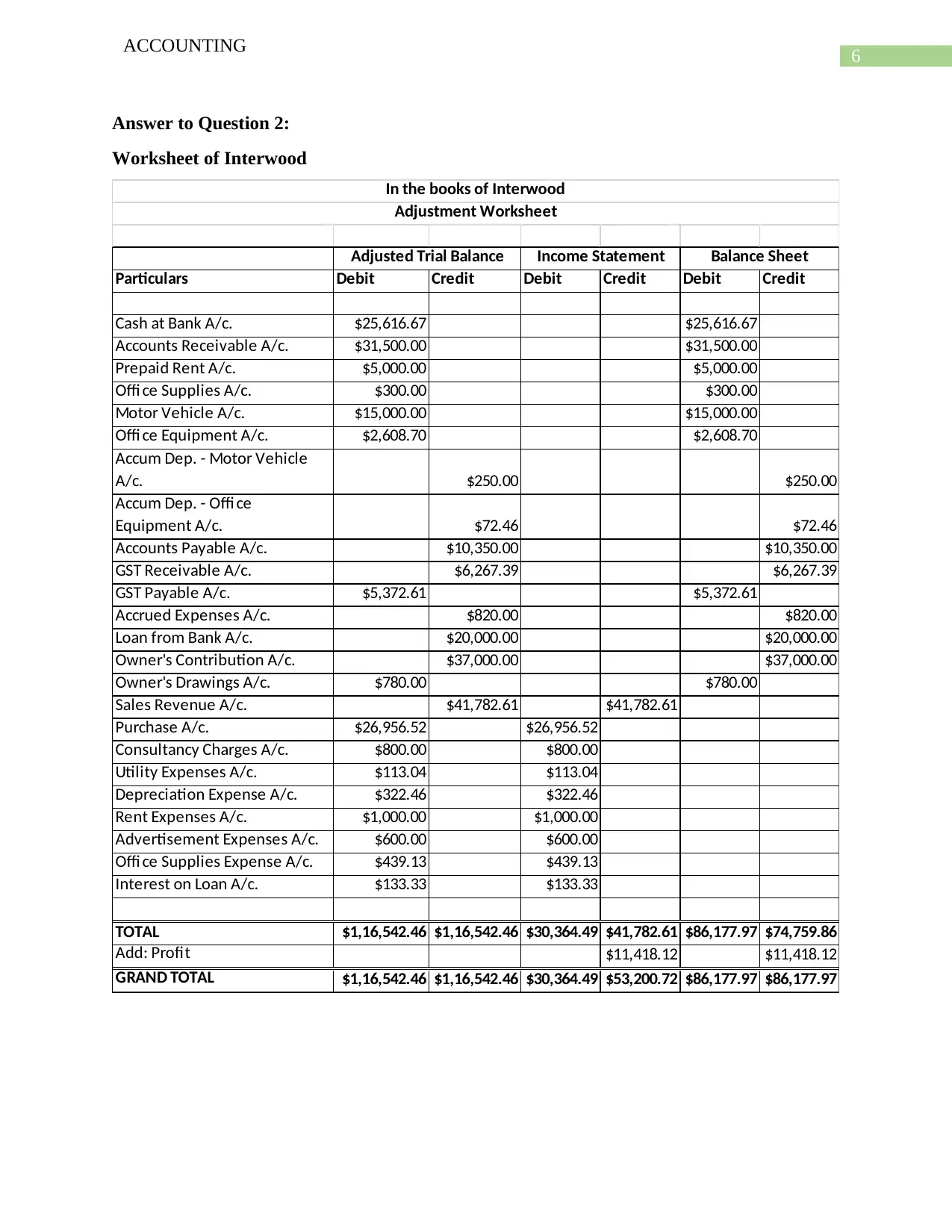
6
ACCOUNTING
Answer to Question 2:
Worksheet of Interwood
Particulars Debit Credit Debit Credit Debit Credit
Cash at Bank A/c. $25,616.67 $25,616.67
Accounts Receivable A/c. $31,500.00 $31,500.00
Prepaid Rent A/c. $5,000.00 $5,000.00
Offi ce Supplies A/c. $300.00 $300.00
Motor Vehicle A/c. $15,000.00 $15,000.00
Offi ce Equipment A/c. $2,608.70 $2,608.70
Accum Dep. - Motor Vehicle
A/c. $250.00 $250.00
Accum Dep. - Offi ce
Equipment A/c. $72.46 $72.46
Accounts Payable A/c. $10,350.00 $10,350.00
GST Receivable A/c. $6,267.39 $6,267.39
GST Payable A/c. $5,372.61 $5,372.61
Accrued Expenses A/c. $820.00 $820.00
Loan from Bank A/c. $20,000.00 $20,000.00
Owner's Contribution A/c. $37,000.00 $37,000.00
Owner's Drawings A/c. $780.00 $780.00
Sales Revenue A/c. $41,782.61 $41,782.61
Purchase A/c. $26,956.52 $26,956.52
Consultancy Charges A/c. $800.00 $800.00
Utility Expenses A/c. $113.04 $113.04
Depreciation Expense A/c. $322.46 $322.46
Rent Expenses A/c. $1,000.00 $1,000.00
Advertisement Expenses A/c. $600.00 $600.00
Offi ce Supplies Expense A/c. $439.13 $439.13
Interest on Loan A/c. $133.33 $133.33
TOTAL $1,16,542.46 $1,16,542.46 $30,364.49 $41,782.61 $86,177.97 $74,759.86
Add: Profit $11,418.12 $11,418.12
GRAND TOTAL $1,16,542.46 $1,16,542.46 $30,364.49 $53,200.72 $86,177.97 $86,177.97
Adjusted Trial Balance Income Statement Balance Sheet
In the books of Interwood
Adjustment Worksheet
ACCOUNTING
Answer to Question 2:
Worksheet of Interwood
Particulars Debit Credit Debit Credit Debit Credit
Cash at Bank A/c. $25,616.67 $25,616.67
Accounts Receivable A/c. $31,500.00 $31,500.00
Prepaid Rent A/c. $5,000.00 $5,000.00
Offi ce Supplies A/c. $300.00 $300.00
Motor Vehicle A/c. $15,000.00 $15,000.00
Offi ce Equipment A/c. $2,608.70 $2,608.70
Accum Dep. - Motor Vehicle
A/c. $250.00 $250.00
Accum Dep. - Offi ce
Equipment A/c. $72.46 $72.46
Accounts Payable A/c. $10,350.00 $10,350.00
GST Receivable A/c. $6,267.39 $6,267.39
GST Payable A/c. $5,372.61 $5,372.61
Accrued Expenses A/c. $820.00 $820.00
Loan from Bank A/c. $20,000.00 $20,000.00
Owner's Contribution A/c. $37,000.00 $37,000.00
Owner's Drawings A/c. $780.00 $780.00
Sales Revenue A/c. $41,782.61 $41,782.61
Purchase A/c. $26,956.52 $26,956.52
Consultancy Charges A/c. $800.00 $800.00
Utility Expenses A/c. $113.04 $113.04
Depreciation Expense A/c. $322.46 $322.46
Rent Expenses A/c. $1,000.00 $1,000.00
Advertisement Expenses A/c. $600.00 $600.00
Offi ce Supplies Expense A/c. $439.13 $439.13
Interest on Loan A/c. $133.33 $133.33
TOTAL $1,16,542.46 $1,16,542.46 $30,364.49 $41,782.61 $86,177.97 $74,759.86
Add: Profit $11,418.12 $11,418.12
GRAND TOTAL $1,16,542.46 $1,16,542.46 $30,364.49 $53,200.72 $86,177.97 $86,177.97
Adjusted Trial Balance Income Statement Balance Sheet
In the books of Interwood
Adjustment Worksheet
Paraphrase This Document
Need a fresh take? Get an instant paraphrase of this document with our AI Paraphraser
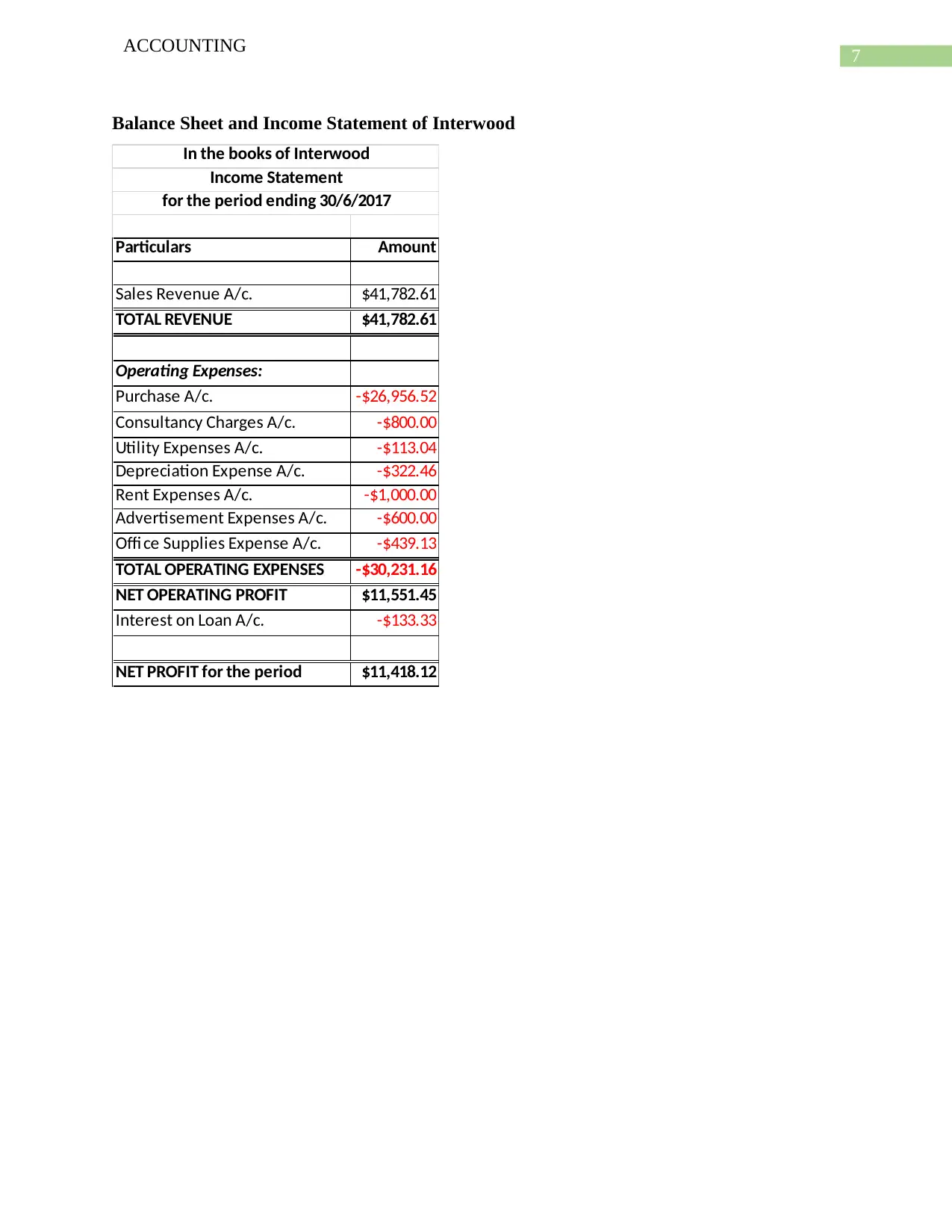
7
ACCOUNTING
Balance Sheet and Income Statement of Interwood
Particulars Amount
Sales Revenue A/c. $41,782.61
TOTAL REVENUE $41,782.61
Operating Expenses:
Purchase A/c. -$26,956.52
Consultancy Charges A/c. -$800.00
Utility Expenses A/c. -$113.04
Depreciation Expense A/c. -$322.46
Rent Expenses A/c. -$1,000.00
Advertisement Expenses A/c. -$600.00
Offi ce Supplies Expense A/c. -$439.13
TOTAL OPERATING EXPENSES -$30,231.16
NET OPERATING PROFIT $11,551.45
Interest on Loan A/c. -$133.33
NET PROFIT for the period $11,418.12
In the books of Interwood
Income Statement
for the period ending 30/6/2017
ACCOUNTING
Balance Sheet and Income Statement of Interwood
Particulars Amount
Sales Revenue A/c. $41,782.61
TOTAL REVENUE $41,782.61
Operating Expenses:
Purchase A/c. -$26,956.52
Consultancy Charges A/c. -$800.00
Utility Expenses A/c. -$113.04
Depreciation Expense A/c. -$322.46
Rent Expenses A/c. -$1,000.00
Advertisement Expenses A/c. -$600.00
Offi ce Supplies Expense A/c. -$439.13
TOTAL OPERATING EXPENSES -$30,231.16
NET OPERATING PROFIT $11,551.45
Interest on Loan A/c. -$133.33
NET PROFIT for the period $11,418.12
In the books of Interwood
Income Statement
for the period ending 30/6/2017
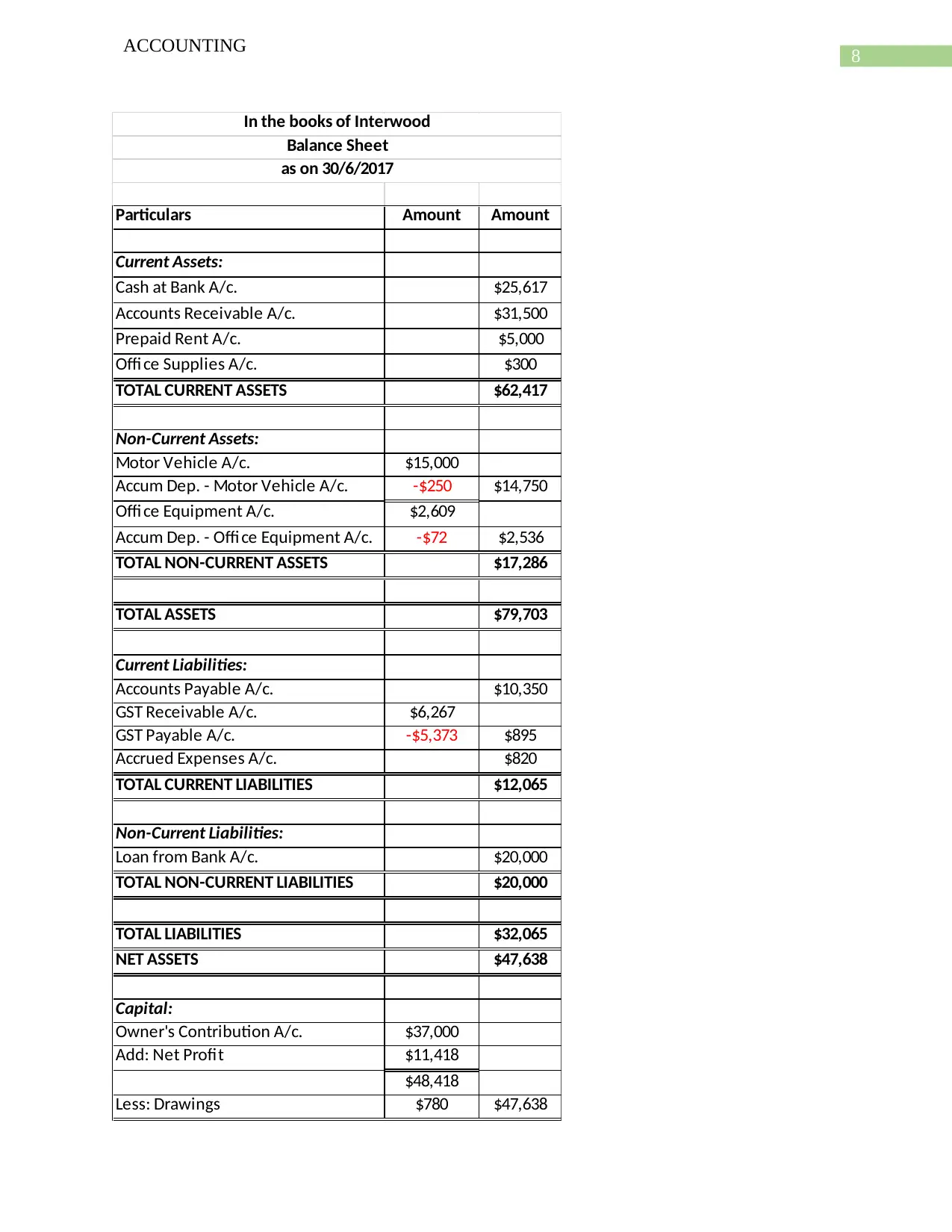
8
ACCOUNTING
Particulars Amount Amount
Current Assets:
Cash at Bank A/c. $25,617
Accounts Receivable A/c. $31,500
Prepaid Rent A/c. $5,000
Offi ce Supplies A/c. $300
TOTAL CURRENT ASSETS $62,417
Non-Current Assets:
Motor Vehicle A/c. $15,000
Accum Dep. - Motor Vehicle A/c. -$250 $14,750
Offi ce Equipment A/c. $2,609
Accum Dep. - Offi ce Equipment A/c. -$72 $2,536
TOTAL NON-CURRENT ASSETS $17,286
TOTAL ASSETS $79,703
Current Liabilities:
Accounts Payable A/c. $10,350
GST Receivable A/c. $6,267
GST Payable A/c. -$5,373 $895
Accrued Expenses A/c. $820
TOTAL CURRENT LIABILITIES $12,065
Non-Current Liabilities:
Loan from Bank A/c. $20,000
TOTAL NON-CURRENT LIABILITIES $20,000
TOTAL LIABILITIES $32,065
NET ASSETS $47,638
Capital:
Owner's Contribution A/c. $37,000
Add: Net Profit $11,418
$48,418
Less: Drawings $780 $47,638
TOTAL CAPITAL $47,638
In the books of Interwood
Balance Sheet
as on 30/6/2017
ACCOUNTING
Particulars Amount Amount
Current Assets:
Cash at Bank A/c. $25,617
Accounts Receivable A/c. $31,500
Prepaid Rent A/c. $5,000
Offi ce Supplies A/c. $300
TOTAL CURRENT ASSETS $62,417
Non-Current Assets:
Motor Vehicle A/c. $15,000
Accum Dep. - Motor Vehicle A/c. -$250 $14,750
Offi ce Equipment A/c. $2,609
Accum Dep. - Offi ce Equipment A/c. -$72 $2,536
TOTAL NON-CURRENT ASSETS $17,286
TOTAL ASSETS $79,703
Current Liabilities:
Accounts Payable A/c. $10,350
GST Receivable A/c. $6,267
GST Payable A/c. -$5,373 $895
Accrued Expenses A/c. $820
TOTAL CURRENT LIABILITIES $12,065
Non-Current Liabilities:
Loan from Bank A/c. $20,000
TOTAL NON-CURRENT LIABILITIES $20,000
TOTAL LIABILITIES $32,065
NET ASSETS $47,638
Capital:
Owner's Contribution A/c. $37,000
Add: Net Profit $11,418
$48,418
Less: Drawings $780 $47,638
TOTAL CAPITAL $47,638
In the books of Interwood
Balance Sheet
as on 30/6/2017
⊘ This is a preview!⊘
Do you want full access?
Subscribe today to unlock all pages.

Trusted by 1+ million students worldwide
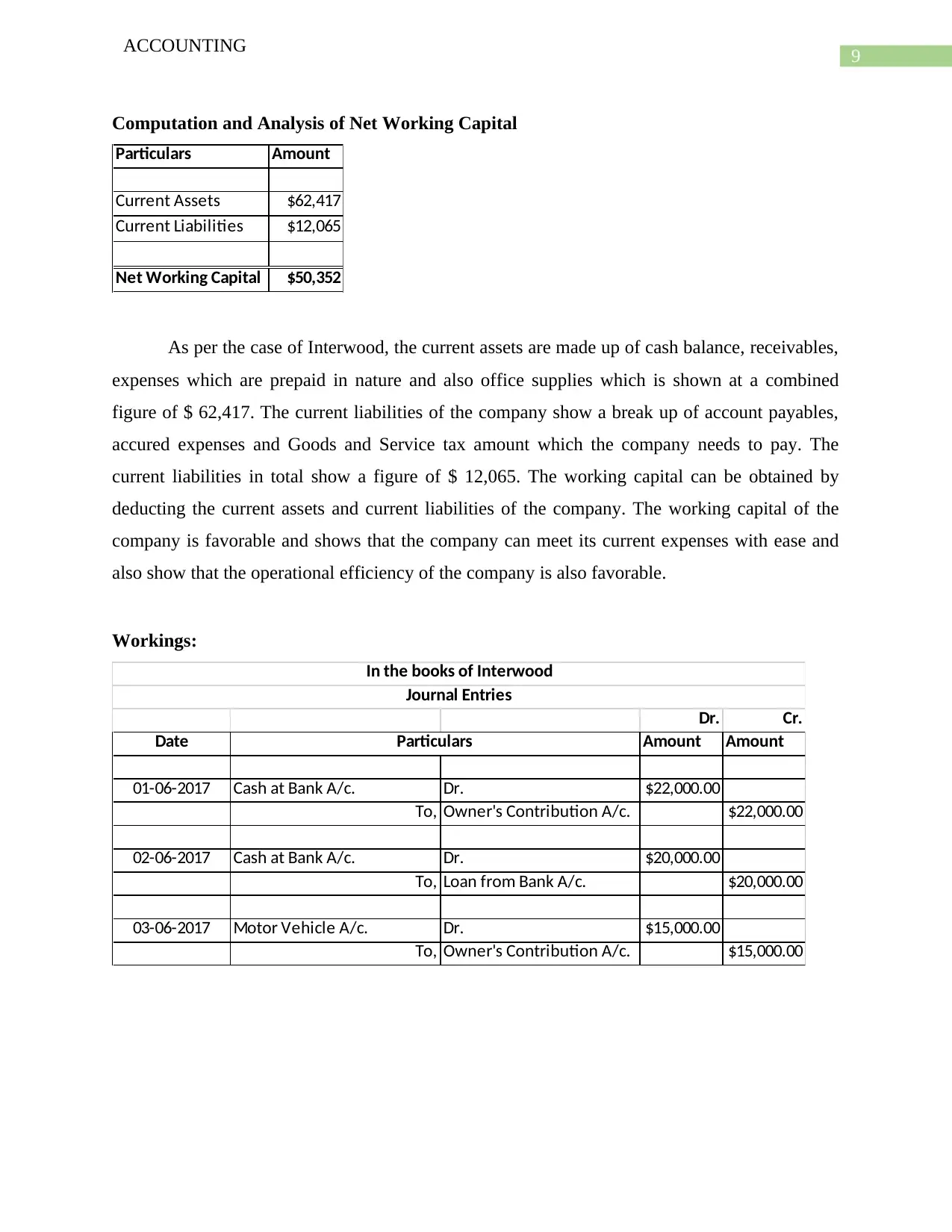
9
ACCOUNTING
Computation and Analysis of Net Working Capital
Particulars Amount
Current Assets $62,417
Current Liabilities $12,065
Net Working Capital $50,352
As per the case of Interwood, the current assets are made up of cash balance, receivables,
expenses which are prepaid in nature and also office supplies which is shown at a combined
figure of $ 62,417. The current liabilities of the company show a break up of account payables,
accured expenses and Goods and Service tax amount which the company needs to pay. The
current liabilities in total show a figure of $ 12,065. The working capital can be obtained by
deducting the current assets and current liabilities of the company. The working capital of the
company is favorable and shows that the company can meet its current expenses with ease and
also show that the operational efficiency of the company is also favorable.
Workings:
Dr. Cr.
Date Amount Amount
01-06-2017 Cash at Bank A/c. Dr. $22,000.00
To, Owner's Contribution A/c. $22,000.00
02-06-2017 Cash at Bank A/c. Dr. $20,000.00
To, Loan from Bank A/c. $20,000.00
03-06-2017 Motor Vehicle A/c. Dr. $15,000.00
To, Owner's Contribution A/c. $15,000.00
Particulars
In the books of Interwood
Journal Entries
ACCOUNTING
Computation and Analysis of Net Working Capital
Particulars Amount
Current Assets $62,417
Current Liabilities $12,065
Net Working Capital $50,352
As per the case of Interwood, the current assets are made up of cash balance, receivables,
expenses which are prepaid in nature and also office supplies which is shown at a combined
figure of $ 62,417. The current liabilities of the company show a break up of account payables,
accured expenses and Goods and Service tax amount which the company needs to pay. The
current liabilities in total show a figure of $ 12,065. The working capital can be obtained by
deducting the current assets and current liabilities of the company. The working capital of the
company is favorable and shows that the company can meet its current expenses with ease and
also show that the operational efficiency of the company is also favorable.
Workings:
Dr. Cr.
Date Amount Amount
01-06-2017 Cash at Bank A/c. Dr. $22,000.00
To, Owner's Contribution A/c. $22,000.00
02-06-2017 Cash at Bank A/c. Dr. $20,000.00
To, Loan from Bank A/c. $20,000.00
03-06-2017 Motor Vehicle A/c. Dr. $15,000.00
To, Owner's Contribution A/c. $15,000.00
Particulars
In the books of Interwood
Journal Entries
Paraphrase This Document
Need a fresh take? Get an instant paraphrase of this document with our AI Paraphraser
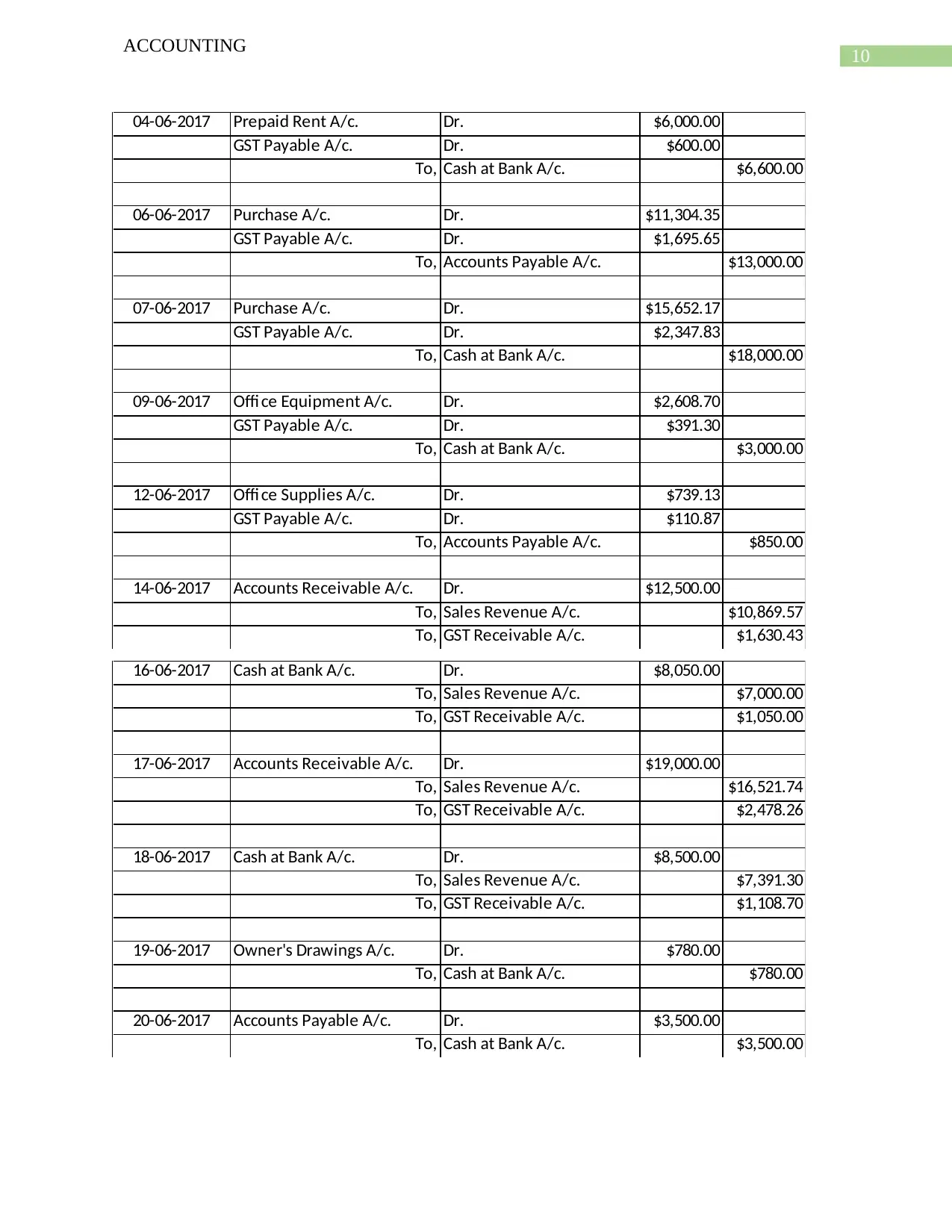
10
ACCOUNTING
04-06-2017 Prepaid Rent A/c. Dr. $6,000.00
GST Payable A/c. Dr. $600.00
To, Cash at Bank A/c. $6,600.00
06-06-2017 Purchase A/c. Dr. $11,304.35
GST Payable A/c. Dr. $1,695.65
To, Accounts Payable A/c. $13,000.00
07-06-2017 Purchase A/c. Dr. $15,652.17
GST Payable A/c. Dr. $2,347.83
To, Cash at Bank A/c. $18,000.00
09-06-2017 Offi ce Equipment A/c. Dr. $2,608.70
GST Payable A/c. Dr. $391.30
To, Cash at Bank A/c. $3,000.00
12-06-2017 Offi ce Supplies A/c. Dr. $739.13
GST Payable A/c. Dr. $110.87
To, Accounts Payable A/c. $850.00
14-06-2017 Accounts Receivable A/c. Dr. $12,500.00
To, Sales Revenue A/c. $10,869.57
To, GST Receivable A/c. $1,630.43
16-06-2017 Cash at Bank A/c. Dr. $8,050.00
To, Sales Revenue A/c. $7,000.00
To, GST Receivable A/c. $1,050.00
17-06-2017 Accounts Receivable A/c. Dr. $19,000.00
To, Sales Revenue A/c. $16,521.74
To, GST Receivable A/c. $2,478.26
18-06-2017 Cash at Bank A/c. Dr. $8,500.00
To, Sales Revenue A/c. $7,391.30
To, GST Receivable A/c. $1,108.70
19-06-2017 Owner's Drawings A/c. Dr. $780.00
To, Cash at Bank A/c. $780.00
20-06-2017 Accounts Payable A/c. Dr. $3,500.00
To, Cash at Bank A/c. $3,500.00
ACCOUNTING
04-06-2017 Prepaid Rent A/c. Dr. $6,000.00
GST Payable A/c. Dr. $600.00
To, Cash at Bank A/c. $6,600.00
06-06-2017 Purchase A/c. Dr. $11,304.35
GST Payable A/c. Dr. $1,695.65
To, Accounts Payable A/c. $13,000.00
07-06-2017 Purchase A/c. Dr. $15,652.17
GST Payable A/c. Dr. $2,347.83
To, Cash at Bank A/c. $18,000.00
09-06-2017 Offi ce Equipment A/c. Dr. $2,608.70
GST Payable A/c. Dr. $391.30
To, Cash at Bank A/c. $3,000.00
12-06-2017 Offi ce Supplies A/c. Dr. $739.13
GST Payable A/c. Dr. $110.87
To, Accounts Payable A/c. $850.00
14-06-2017 Accounts Receivable A/c. Dr. $12,500.00
To, Sales Revenue A/c. $10,869.57
To, GST Receivable A/c. $1,630.43
16-06-2017 Cash at Bank A/c. Dr. $8,050.00
To, Sales Revenue A/c. $7,000.00
To, GST Receivable A/c. $1,050.00
17-06-2017 Accounts Receivable A/c. Dr. $19,000.00
To, Sales Revenue A/c. $16,521.74
To, GST Receivable A/c. $2,478.26
18-06-2017 Cash at Bank A/c. Dr. $8,500.00
To, Sales Revenue A/c. $7,391.30
To, GST Receivable A/c. $1,108.70
19-06-2017 Owner's Drawings A/c. Dr. $780.00
To, Cash at Bank A/c. $780.00
20-06-2017 Accounts Payable A/c. Dr. $3,500.00
To, Cash at Bank A/c. $3,500.00
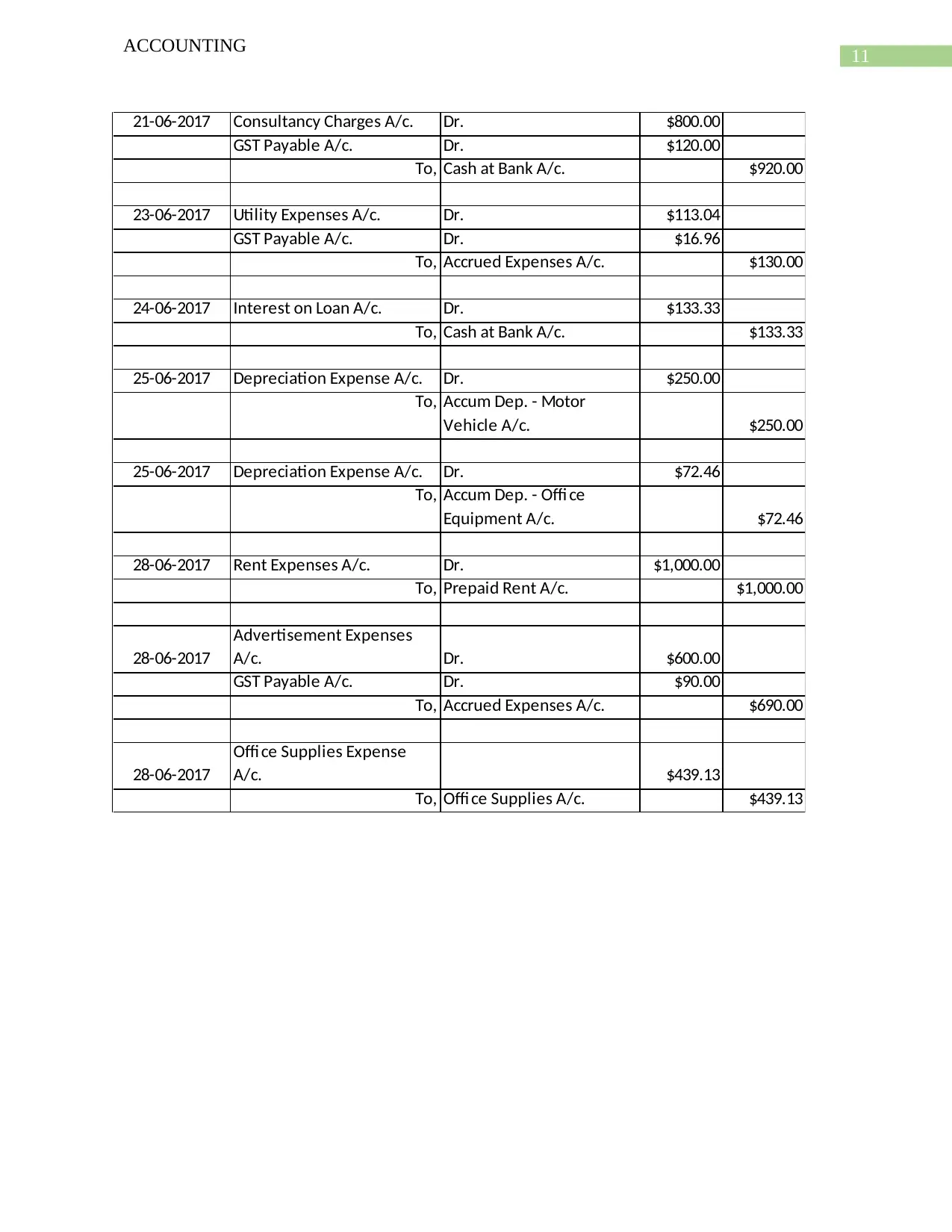
11
ACCOUNTING
21-06-2017 Consultancy Charges A/c. Dr. $800.00
GST Payable A/c. Dr. $120.00
To, Cash at Bank A/c. $920.00
23-06-2017 Utility Expenses A/c. Dr. $113.04
GST Payable A/c. Dr. $16.96
To, Accrued Expenses A/c. $130.00
24-06-2017 Interest on Loan A/c. Dr. $133.33
To, Cash at Bank A/c. $133.33
25-06-2017 Depreciation Expense A/c. Dr. $250.00
To, Accum Dep. - Motor
Vehicle A/c. $250.00
25-06-2017 Depreciation Expense A/c. Dr. $72.46
To, Accum Dep. - Offi ce
Equipment A/c. $72.46
28-06-2017 Rent Expenses A/c. Dr. $1,000.00
To, Prepaid Rent A/c. $1,000.00
28-06-2017
Advertisement Expenses
A/c. Dr. $600.00
GST Payable A/c. Dr. $90.00
To, Accrued Expenses A/c. $690.00
28-06-2017
Offi ce Supplies Expense
A/c. $439.13
To, Offi ce Supplies A/c. $439.13
ACCOUNTING
21-06-2017 Consultancy Charges A/c. Dr. $800.00
GST Payable A/c. Dr. $120.00
To, Cash at Bank A/c. $920.00
23-06-2017 Utility Expenses A/c. Dr. $113.04
GST Payable A/c. Dr. $16.96
To, Accrued Expenses A/c. $130.00
24-06-2017 Interest on Loan A/c. Dr. $133.33
To, Cash at Bank A/c. $133.33
25-06-2017 Depreciation Expense A/c. Dr. $250.00
To, Accum Dep. - Motor
Vehicle A/c. $250.00
25-06-2017 Depreciation Expense A/c. Dr. $72.46
To, Accum Dep. - Offi ce
Equipment A/c. $72.46
28-06-2017 Rent Expenses A/c. Dr. $1,000.00
To, Prepaid Rent A/c. $1,000.00
28-06-2017
Advertisement Expenses
A/c. Dr. $600.00
GST Payable A/c. Dr. $90.00
To, Accrued Expenses A/c. $690.00
28-06-2017
Offi ce Supplies Expense
A/c. $439.13
To, Offi ce Supplies A/c. $439.13
⊘ This is a preview!⊘
Do you want full access?
Subscribe today to unlock all pages.

Trusted by 1+ million students worldwide
1 out of 18
Related Documents
Your All-in-One AI-Powered Toolkit for Academic Success.
+13062052269
info@desklib.com
Available 24*7 on WhatsApp / Email
![[object Object]](/_next/static/media/star-bottom.7253800d.svg)
Unlock your academic potential
Copyright © 2020–2026 A2Z Services. All Rights Reserved. Developed and managed by ZUCOL.



